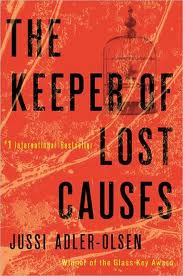Jussi Adler-Olsen
Dutton

|
He’d thought it would make his life easier, having an assistant. The man would have plenty to do while Carl kept busy counting off the hours behind his closed eyelids. The floor had to be washed, coffee had to be made, and documents needed to be added to the case files, which then had to be put away There would be more than enough tasks to occupy him, he’d thought at first. But now, a little more than two hours later, the man was sitting there, staring at him with his big eyes, and everything was nice and neat and tidy… “Do you like solving Soduku puzzles … ?” he asked, handing Assad the magazine. |
Enjoying your mystery with a Danish
Jussi Adler-Olsen has been called “Denmark’s Stieg Larsson”—which you just know has to be irritating to Jussi Adler-Olsen.
Olsen is Denmark’s #1 crime writer and the author of a number of international bestsellers (I’m going off the book blurb here because how would I know?)
Full disclosure: Detective fiction is not my genre of choice. I think I am one of maybe five people in the northern hemisphere who were not absolutely enthralled with The Girl with the Dragon Tattoo. Nagging questions of plausibility keep interrupting my involvement in these kinds of stories.
But I was drawn to The Keeper of Lost Causes by its title. Spending most of my life in social services, I suppose I identified with it.
Olsen’s detective is grumpy, grouchy, ill-humored Carl Mørck, recuperating from being shot in an incident that left one of his colleagues dead and the other paralyzed. We may wonder that his anti-social moods are the result of the trauma he suffered, but no, we learn Carl was like this before the shooting.
Mørck returns to duty and, due to his personality deficit, is given a do-nothing job in the basement by himself, responsible for closing dead cases, the “lost causes” of the title.
One of these cases is the mysterious disappearance five years ago of Merete Lyngaard, a member of parliament. Merete was bright, beautiful, vivacious and popular, so of course she had many enemies.
But she is not dead. She is being confined in some mysterious chamber (I am not giving anything away here. You learn this in the prologue—and in the blurb.)
Mørck is saved from being bland and boring through his assistant, Assad, an immigrant who has been assigned to clean up after him. Assad is lively, curious and hyper—everything Carl is not. Just as Larsson’s Girl trilogy was elevated above the norm by the fascinating character of its tattooed hacker Lisbeth Salander, what sets Keeper above the norm is Carl and Assad’s relationship.
While Keeper lacks the grisly murders and torture that so delighted Larsson’s readers, discovering where Merete is being held is good for at least a horrific shudder, maybe even a gasp.
As Lincoln diplomatically observed once when asked about a popular book of his day, people who enjoy this kind of book will probably like it.
And I highly recommend the title.
This review first appeared in The Columbia River Reader (November 15 - December 14, 2011). Reprinted with permission.



